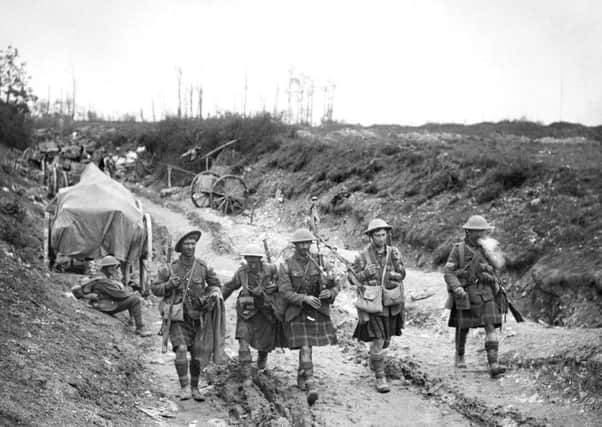How pipers called the shots at the Somme


London-born Sir Philip Gibbs (1877-1962), one of five official reporters during the First World War, wrote about the effects of the pipes and the extraordinary bravery of pipers and Highlanders among the British forces at the Battle of Delville Wood near the village of Longueval which raged from 15 July to 3 September 1916.
During the Great War 100 battalions had more than 2,500 pipers with them. Of these, 500 pipers were killed and 600 wounded.
Advertisement
Hide AdAdvertisement
Hide AdGibbs’ searing account of warfare led to him being ordered to return home as the War Office attempted to “manage” information about the war.
He refused to comply and was arrested and sent home. However, desperate to return to the front, he submitted to censorship.
Writing about the Battle of Delville Wood, Gibbs noted: “It was to the tune of the The Campbells Are Coming that one regiment went forward… heard with terror, beyond a doubt, by the German soldiers.
“Then the pipes screamed out the Charge, the most awful music to be heard by men who have the Highlanders against them, and with fixed bayonets and hand-grenades they stormed the German trenches.”
Reporting the hand-to-hand fighting, he wrote that he believed the Highlanders’ bravery was “habitual” as well as gallantry in war.
He described regiments marching out of the war zone “their kilts caked in mud and stained with blood and filth”, with a piper playing the love song by Hector MacNeil (1746-1818) a Scottish poet who was born near Roslin, Midlothian.
“They brought their music with them, and the pipes of war were playing a Scottish love song I Love Nae Laddie But Ain.
Hugh Anderson, curator of the College of Piping in Glasgow, said pipers paid a high price for their role in battle.
Advertisement
Hide AdAdvertisement
Hide Ad“They were the first ones out of the trenches. Their job was to rouse the troops and get them fired up. But when they were not in action their role was also very important with many acting as stretcher- bearers and entertaining the troops to keep morale up.”
Dr Yvonne McEwen, director of Scotland’s War 1914-1919, at the University of Edinburgh, said the Germans were acutely aware of the power the pipers had to motivate Scottish troops and that research has shown music was also highly therapeutic in the war.
“It really was a way of driving the men on and intrinsically linked to Scottish identity. The pipers were there for morale and the Germans knew they would rally the troops,” she said.
McEwen, an author and broadcaster whose research on First World War history has reached an audience worldwide, added: “The pipe music was also something deeply comforting to the Scottish soldiers, as it is so tied up in their Scottish identity.
“But afterwards, when the immediate fighting was over, laments were played to signify the loss and reverence and to make sure they gave a respectful death to Scottish men who died in battle.”
In 2002 a memorial was unveiled in Longueval to pipers killed in the Great War.